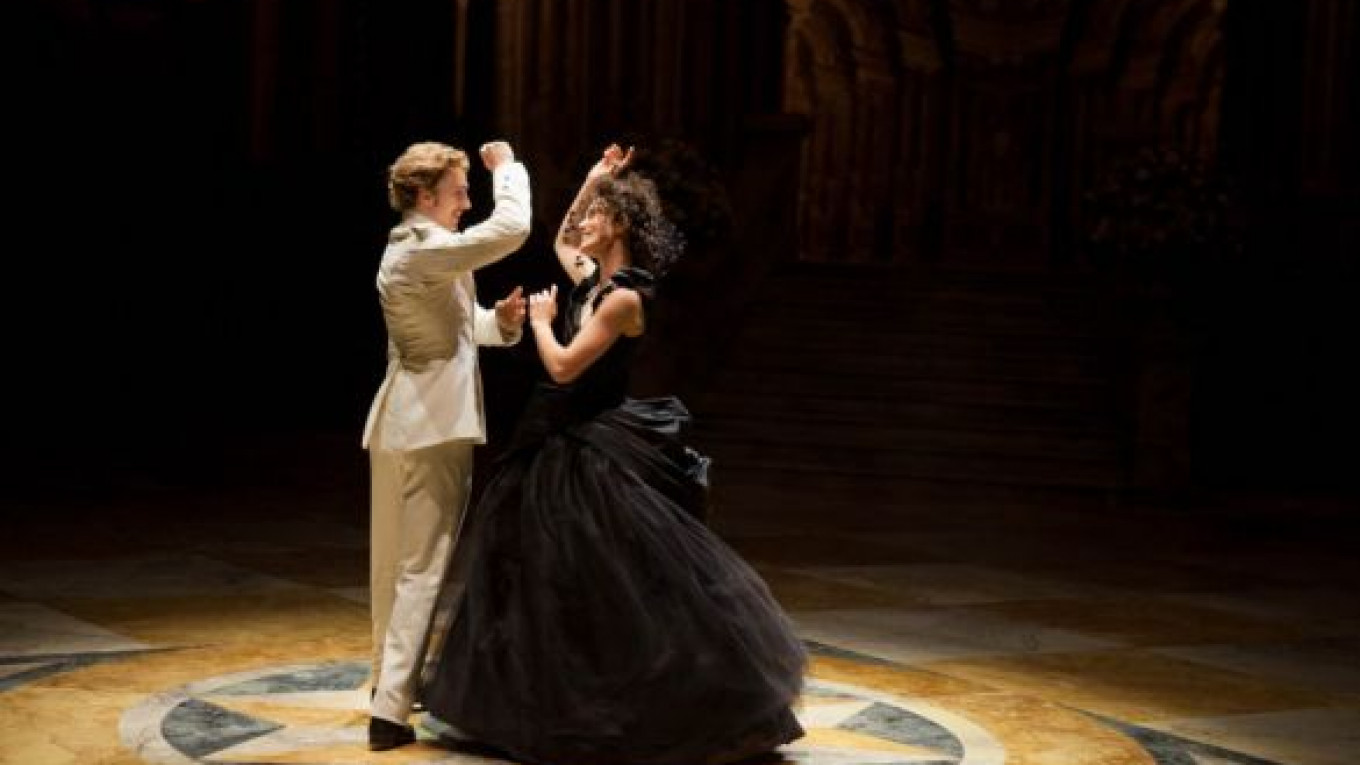Loudly and menacingly, the train on the large screen of a darkened cinema raced toward the audience in a foreshadowing that the lead character, just a few years deeper into the plot, would commit suicide by throwing herself on the railroad tracks.
The expected response would have been gasps of horror or, at the very least, silence. Instead, the movie audience burst into giggles.
Western film critics have given the British big-screen adaptation of Leo Tolstoy's "Anna Karenina" rave reviews, and the movie generated four Academy Award nominations, including best cinematography and musical score.
Russian audiences, however, were not as enthusiastic about the newest foreign take on their beloved classic when it opened in theaters last week.
The New York Times reviewer, who called the movie a "brilliant gamble," warned that "pious Tolstoyans may knit their brows about the stylistic liberties" taken in director Joe Wright's "Anna Karenina."
Never mind pious Tolstoyans. The film appears to have sparked a nationwide? debate on the eternal question of whether the foreign filmmakers really understood the mysterious Russian soul.
Screenshots of the moving train were the easiest targets of ridicule. Vladimir Nifedov and Yevgeny Safronov were among those in the audience who laughed when the train rolled up to the station completely covered in ice and snow, perhaps as Wright's subtle reminder of Russia's subfreezing temperatures.
"This film took up two hours of my time and didn't give back anything useful," Nifedov wrote in an online comment. "Foreigners won't be able to understand the Russian soul no matter how much they try. Plus, they are more skilled at filming movies with computer graphics."
Patriotic viewers may have had some of their complaints subdued by the use of Russian-inspired melodies in the film, but they questioned why the filmmakers could not spare some of their $49 million budget to hire local artists who would sing without accents.
"Americans shouldn't film movies about Russians, especially screen adaptations of Russian classics! It turns out that except for the name the film doesn't have anything Russian about it," Lena Ioffe commented online. ?
Some casting decisions were also deemed too inauthentic. Russian audiences complained that the? supposedly ethnic Russian woman who cares for Konstantin Levin's brother actually resembles a South Asian refugee. In the same vein, an Afisha reviewer compared the dirt-covered train worker who dies in the beginning of the film to an orc from "The Hobbit."
Even the wordless peasants among the extras didn't escape the scrutiny of Russian filmgoers, who remarked that their shirts are unnaturally clean.
But the lion's share of the criticism was heaped on the main actors. Keira Knightley's ample experience playing well-dressed Russian women, thanks to her roles in "Doctor Zhivago" and "The Dangerous Method," didn't spare her from remarks that she was too skinny to play the plump Karenina.
Even these comments were mild compared with filmgoers' charges against the dashing military officer Alexei Vronsky, played by Aaron Taylor-Johnson. Too short, too young and too blond.
Afisha's Boris Nelepo settled for calling his performance worthy of an audition for a Backstreet Boys music video.
In fact, the only key actor who seemed to have escaped public scorn was Jude Law. Audiences and critics alike praised him for his uncharacteristically uncharismatic portrayal of deceived husband Alexei Karenin.
Fortunately for the filmmakers, not all Russians walked out of movie theaters feeling sorry for Wright's disregard of ballroom dance history or disgruntled by the quantity of exposed flesh in proportion to Tolstoy's subtle hints about Karenina's love affair.
Political analyst Stanislav Belkovsky praised the film as the best to come out in years.
"This is the best 'Anna Karenina' of all time, in my opinion. It surpasses any 'Anna Karenina' that we have ever seen," he told Echo Moskvy radio before thoughtfully adding: "Now everyone will get mad at me."
Related articles:
A Message from The Moscow Times:
Dear readers,
We are facing unprecedented challenges. Russia's Prosecutor General's Office has designated The Moscow Times as an "undesirable" organization, criminalizing our work and putting our staff at risk of prosecution. This follows our earlier unjust labeling as a "foreign agent."
These actions are direct attempts to silence independent journalism in Russia. The authorities claim our work "discredits the decisions of the Russian leadership." We see things differently: we strive to provide accurate, unbiased reporting on Russia.
We, the journalists of The Moscow Times, refuse to be silenced. But to continue our work, we need your help.
Your support, no matter how small, makes a world of difference. If you can, please support us monthly starting from just $2. It's quick to set up, and every contribution makes a significant impact.
By supporting The Moscow Times, you're defending open, independent journalism in the face of repression. Thank you for standing with us.
Remind me later.


